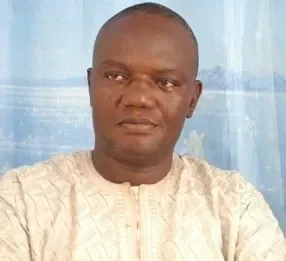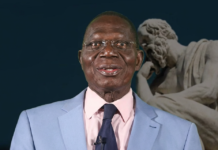By Festus Adedayo
It was almost impossible not to be infected by the joy writ large on the face of the One-party state Villa-fawning group this past week. It was akin to winning a tombola. The Mauritanian-Nigerian ex-spokesperson for the Arewa Elders Forum and until of recent, Special Adviser on Political Matters to the President, Hakeem Baba-Ahmed, would not allow these elated countrymen the benefit of a hard-earned Saturnalia. Momentarily, he made sitting comfy on a stool a punishing exercise for the group. As he tendered his letter of resignation from government, fire billowed from Baba-Ahmed’s mouth like Sango, the Yoruba god of fire. In a viral video interview, the Mauritanian – beg your pardon – the Nigerian, reached for his ancient Arewa pouch and brought out an insinuation of the North’s oft-mesmerizing demographic talisman.
If the North’s foe in Aso Rock Villa was gloating about a power of incumbency, he should remember that the North is a behemoth that anyone could ignore only at their peril, he reminded the president, until of recent his boss. “No politician can become president without northern support, making the region’s stance crucial to any aspirant’s success,” he warned, garnishing it with the usual obstinate northern threat, “If they plan to rig the election, they should be careful. It won’t be good for Nigeria.” As if the north had always been a saint when it comes to rigging. How come this same north closed its eyes when the ruinous Muhammadu Buhari almost ran Nigeria aground in eight years?
In a recent piece I did, I warned that, in the headship of today’s Nigeria, Nigerians had never met the kind of political wiles and deadly political machinations that are in the hands of the current occupiers of Aso Rock. Citing evergreen Yoruba Juju music superstar, King Sunny Ade’s imperishable line, “We m’ẹni o kò, Paddy…” I told the Nigerian world that by the time the current Taskmaster is done with us, we would be worn thin. So, last week, an ignited political bomb exploded. Governor of Delta State, Sheriff Oborevwori and his EFCC-harangued predecessor, Peoples Democratic Party (PDP) vice presidential candidate in the 2023 elections, Ifeanyi Okowa, shamelessly decamped from the PDP to the All Progressives Congress (APC). An equally shameless Akwa-Ibom State governor gave indication that he would stay within the PDP and rock its boat. Both moves were replicas of same act some 2000 years ago by that notorious man who asked for 30 pieces of silver to betray our Lord Jesus Christ. Political watchers say this political Iscariotism is a tip of the iceberg. More opposition party governors, they said, many of whom are first-termers, are having their buttocks placed on scalding-hot pressure cooker in the bid to make them leave their parties for the president’s. Chief among these, they say, are governors of Kano, Osun, Plateau, Rivers, Taraba, Akwa Ibom and Zamfara states.
The gleeful repertoire of conquest narratives from the presidency and the Villa fawning group fill the stratosphere.The glee was so thick you could cut a handful and swallow it. The defection fever threw National Chairman of the APC, Abdullahi Umar Ganduje, into a spasm. Reminiscent of Vincent Ogbulafor’s punctilious proclamation some years ago who, in his moment of uncontrollable drunkenness with the intoxicating wine of power, said the PDP would rule Nigeria for 50 years, Ganduje, last Thursday, traveled same inglorious route. He surveyed the political horizon and was so titillated by what he saw that he announced that APC’s 2027 project was a done deal. Thumping his chest like one who had just won a jackpot, the party chair, who is still embroiled in allegation of fraud while governor of Kano State, assured that more defections of governors from the opposition parties were afoot. His infelicitous boast came while he formally received defectors from the New Nigeria Peoples Party (NNPP), Kano state chapter.
In Nigeria today, the man whose wily stratagem is known to have incubated these defections is being garlanded with epithets. Like maggots brimming round decaying meat, the salutes to his wiles are so aeonic that they qualify to rival the biblical “This is the voice of a god, not of a man!” Students of the bible will remember that the crowd at Judea made that remark in response to Herod Agrippa 1’s considered superlatives. The epithets showered on the man who is considered to have broken the spinal cord of Nigeria’s opposition in such magisterial manner range from, “the enigmatic Master Strategist has struck again!”, to “The man who pocketed Lagos State in the last 25 years has added Nigeria to his state-pocketing craft.”
For the Yoruba, their naughty son with amoeba-shaped buttocks, who deserves their waist-beads and not an outsider – an “at’ohunrinwa” – the celebration is even more infectious. From their proverbs pouch, the Yoruba pulled out an ancient saying to justify and enable the perceived routing political craftiness of their son. To them, the rout is a perfect reply to the Mauritanian boaster. So, they say, “as it is on the day set for cultivation of a large farmland that the urgency to own a sharp cutlass becomes imperative, so is it gladsome to have a belligerent child when there is a declaration of war” (Ọjọ́ a ba pa’juba l’aa níran àdá, ọjọ ogun bá lè làá níran ọmọ líle). Only the man who is ensuring that opposition governors decamp to the APC can vanquish their centuries-old northern political foes who, at every drop of a hat, flaunt nebulous demographics as political weapon in electoral contest. The North’s snake has met its waterloo in its bid to swallow the Yoruba shrew.
For me, however, an eerie feeling of foreboding has since last week enveloped my reading of the projected epidemic of decamping opposition politicians. My mind immediately dashed down to eponymous Yoruba thespian, Alagba Adebayo Faleti and his sagely takes on Pyrrhic celebrations, the type that Aso Rock and its fawners are currently taking to the bank. With songs, sang in the cadences of an elderly’s, Faleti drilled down the surface of today’s clanking of champagne glass and saw a melancholic tomorrow. His cameo role in Saworoide, a satiric brainchild film of unarguably one of Nigeria’s most talented cinematographers, Tunde Kelani, provided Faleti an opportunity to penetrate this dense outer surface. Acting the role of Baba Opalaba, (a piercing broken bottle) an elderly palace staff, Faleti deployed music as tool to foretell, reprimand and correct. While the chiefs became a combine of evil, fascinated about immediate riches in a new king, and plotting against the tomorrow of the people, Baba Opalaba warned, singing, “Yes, they are unaware of their action’s repercussion/Tomorrow, they will” (Kò í ye wón, yíò yé wọn l’ọla ).
In another of his warnings, Faleti deployed a proverb to foretell doom: “The wretched wearing torn clothes dances like a king at nocturne, as if unaware that daybreak is nigh (Alakisa n jo l’oru/Bo pe, ile a mo l’ola). If only the Aso Rock/APC celebratory crew was aware of the wiles of their Mephistopheles, they would see what happened last week and what is projected to happen, as moments to, like biblical Israelites did when there was doom, decorate themselves in ashes and soberly mourn what lies ahead. The doom is also popularized by the song of Yoruba Sakara music great, Yusuff Olatunji. He sang of a hawk playing with the pigeon and the pigeon is filled with excitement, unbeknown to it that death lurks in the horizon (Asa nb’ẹyẹlé ṣeré, ẹyẹlé nyọ, ẹyẹlé nfi’ ikú ṣeré ). Is this celebratory gang aware that it is cultivating a fertile ground for Mephistopheles to reign in Nigeria, for the nourishment of a one-party state, with all its attendant evils? One feels like telling this lot celebrating inanity what Hamlet told Ophelia: “Get thee to a nunnery and stop breeding fools into the world.”
Naomi Mitchinson’s “One Party Rule In Africa” The Commonwealth Journal of International Affairs (2008) gives an intellectual foretaste of this hawk/pigeon mutual excitement. So also did Peter Anyang Nyong’o, in his “Africa: The failure of one-party rule,” Journal of Democracy, Volume 3, Number 1, January 1992. Nyong’o particularly saw doom ahead for the people in what is being cobbled together by the APC. According to him, while it was good news that the peoples of Africa are awakening from years of slumber under authoritarian rule and taking their future in their own hands. The bad news, he said, is that, regimes which enjoy absolute power over “terrorized natives” are sprouting in Africa. These are regimes which, in reluctance to allow themselves to be liquidated out of office and let go of power, “are doing all they can to hold back the rising democratic tide.”
One-party state regimes emerged in Africa during the decolonization period. They thereafter began to spread, with many of them adopting it as a means of consolidating power and, in their claim, promoting national unity.
In its manifestations, one-party state is indeed the holding back of Africa’s democratic tide. Margaret Monyani of the University of Witwaterstrand once defined it as a political framework “where a one/single political party forms and runs the government.” This can happen in two ways: “the activities of the opposition may be completely outlawed such that even the opposition leaders are not allowed to participate in elections” or “the chances of the opposition to clinch power are thwarted by the unfavourable legal framework that is in place… in some cases, a dominant political party that is in power only allows other less dominant parties who are allied to it to exist, while completely outlawing the opposition parties.”
While the establishment of a one-party state in Tanzania and Kenya was done through the parliament, making the formation of another party illegal, in some other countries where the one-party state structure was adopted, it is the voluntary dissolution of the political parties that makes it a one-party state. In this, the leaders and supporters of the parties are absorbed into the one-party state structure. In the words of Peter Wanyande, writing with the title, “Democracy and the One-party state: The African experience” (1987), published in the book, Democratic Theory and Practice in Africa (Y. O. Oyugi and A. Gitonga eds.), this structure of one party-rule makes such countries de jure one-party state, rather than de-facto.
Our African nationalist forefathers sold this system of governance to Africa as holding hope. Kenya, Ghana, Zamabia, Mali, Senegal, Burkina-Fasso and Tanzania were some of the countries that first adopted the one-party system. Among others, the nationalists’ justification for a one-party state was that it is the only form of governance native to Africa while multi-partyism was an alien construct. According to them, a one-party state promotes national unity and in it, national efforts would be solely directed toward nation building, rather than on fruitless politicking. Similarly, they reasoned, in the words of Nyong’o, whatever differences that might emerge among the people of a single political party “could be freely settled… for democracy would be practiced and human rights respected.” Tanzania’s former president, the Walimu, Julius Nyerere, was one of the early proponents of one-party regime. While foisting one-party rule on Tanzania in 1965, Nyerere lauded it thus: “where there is one-party state and that party is identified with the nation as a whole, the foundations of democracy are firmer than they can ever be (in a situation where) you have two or more parties each representing only a section of the community.”
Kenya under successive one-party governments, not long after, degenerated into authoritarianism. The economic development which the likes of Jomo Kenyatta and Arap Moi envisaged became a mirage. Kenyatta’s Kenya African National Union (KANU) fused with the main opposition party and became one single party. In 1964, Kenyatta then led the legislature to write into the constitution the office of the president with him as the leader. Not long after, this one-party state morphed into a bud of corruption, disregard for merit and a system where loyalty to the Fuhrer was rewarded. Those who did not pledge full loyalty to the party and the president were hounded.
Ghana’s Kwame Nkrumah, which began the one-party system in 1964, became a dictatorial and authoritarian government. It repressed voices of dissent under the facade of maintaining unity. Nkrumah fatally wounded multi-party system of government by labeling it as divisive and thus not fit for the newly independent African states. What was needed, he said, was a unified energy and enthusiasm to move Africa forward. These African countries practicing one-party state system then ended up choosing socialism as a system of governance. In Tanzania, its own one-party state was the Chama Cha Mapinduzi (CCM), a political party which was in power from the inception of the country’s independence in 1961. This same fusing happened in Burkina-Faso following the election of President Yaméogo in 1959. Opposition leaders fused together shortly after the 1959 election with Yaméogo proclaiming a ban on any other political parties, thus making his Union of Voltaic Democrats (UDV- RDA) to become the country’s one-party state.
One unique feature of the one-party states in all the above-named countries is that, as butterflies are attracted to nectar, those states always attracted military putsches. One by one, all the one-party system countries were dismantled by violent military takeovers. This is due to resistance and rebellion against their authoritarian rules.
So, for the celebrating Villa-fawning group that is shuffling its feet in acrobatic dance to the Bata drum as the group careens Nigeria towards a one-party state, the above examples are my own re-calibration of another of Baba Opalanba’s song. The sage sang: “The bird doesn’t just perch on the patio, it has ears and hears.” He rendered this thus, “Ọrọ l’ẹyẹ gbọ, ẹyẹ o dédé bà l’òrùlé o, ọrọ l’ẹyẹ ngbọ o”.
For us as a collective, this gale of defection is more than a political chess-game. It is ominous. For those who know, it has high flavour of despotism, which is a by-word for the Fuhrer’s brand of politicking. Many one-party states’ helmsmen eventually morph into life presidents of the Gnasingbe Eyadema hue. While many see a mild, Cockney English accent-flavoured-speaking Villa boss, beyond this veneer is a totalitarian for whom “No” can never be an answer. Many of the first-term governors are currently being held on tenterhooks, their second term used as bait by Aso Rock. A case is a governor whose godfather was manifesting traits of dissent. Suspecting that the governor might go the way of his godfather, Aso Rock immediately began to sponsor a SWAGA Lord as countervailing force to run against him in the soon-to-be-held gubernatorial election. A few days ago, both the governor and his godfather addressed a press conference announcing their support for Aso Rock 2027!
There is the tendency for anyone to see an impending one-party state in Nigeria as too remote. There is also the tendency to say, all that is foul is fair in politics. Or that, others before the current occupiers of the Villa did worse. In the allegory of the hawk and the pigeon, it was only when the pigeon landed inside the hawk’s abdomen, with its entrails as gourmet meal, that the warning made sense.
























